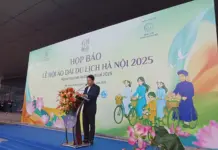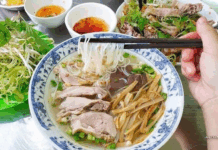Hanoi is trying its best to create a favorable environment and ecosystem for the innovation and development of the cultural industry, said Deputy Secretary of the Hanoi Party Committee Nguyen Van Phong.
Making a speech at a seminar on the city’s cultural industry development in the 2021-25 period, with a vision to 2045, held in Hanoi on June 18, Phong said the capital city is actively seeking cooperation from creative organizations and individuals to promote the inheritance and development of the culture of the thousand-year-old capital.
| Domestic and foreign artists joined a parade around the pedestrian streets around Hoan Kiem to celebrate the 20th anniversary of Hanoi’s recognition as a “City for Peace” by UNESCO in 2019. Photo: Kinh te & Do thi |
At the seminar, participants from domestic and foreign agencies and organizations gave out many solutions to help the municipal authorities resolve existing difficulties and reach its targets as well.
According to UNESCO Representative to Vietnam Michael Croft, after Hanoi joined the Creative Cities Network, UNESCO has worked with city leaders and the central government to make the vision of Hanoi of becoming a creative capital a reality.
Croft said the creative city will be typical of Hanoi’s brand and image, towards integration and sustainable development.
He said the UNESCO, in collaboration with partners including UN-Habitat, UNIDO and SOVICO Group, has developed a three-year project of Mobilizing cultural dynamics and youth participation for Ha Noi Creative Capital. “This will help advance the new strategic vision for the creative capital – a city that empowers its citizens to build a balanced, diverse and innovative economy towards a more sustainable, people-centered approach to the development.”
| In 1999, Hanoi was honored by UNESCO with the title during a ceremony held in La Paz, the capital of Bolivia. The city remains the only capital in the Asia-Pacific region to receive recognition. Photo: Kinh te & Do thi |
Vice President of the Cultural Heritage Association of Vietnam Le Thi Minh Ly pointed out that Hanoi has great potentials to gain a sustainable cultural industry, but the shortage of information database for the cultural industry, an effective connection among relevant sectors, professional and managerial skills, and investment mechanism, is hindering the process.
Additionally, Assoc. Prof. Dr. Nguyen Thi Thu Phuong, Deputy Director of the Vietnam National Institute of Culture and Arts emphasized that Hanoi had abundant cultural resources but limited investment capital for cultural development.
“The city needs a reform. This is an important step to promote Hanoi’s cultural power for a breakthrough investment policy. Fostering creative capacity and shaping a creative environment for talents must be a fundamental solution,” she said.
At the event, participants put forward many ideas and solutions that focus on creating the financial investment mechanism and attracting local and international investment in infrastructure, science, and technology.
Hanoi’s Party Deputy Secretary Phong said these ideas and solutions are really important to help the city realize its goals of turning the cultural industry into a spearhead economic sector, making Hanoi be a cultural industrial hub of Vietnam.
The seminar was the second one in a series organized by the municipal Party Committee to mobilize intellectual and enthusiastic contributions to the goal of developing cultural industries into a resource for sustainable development. The first workshop took place on June 10.





